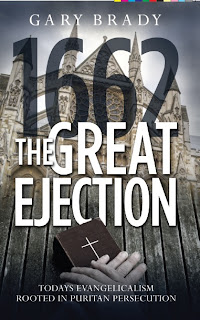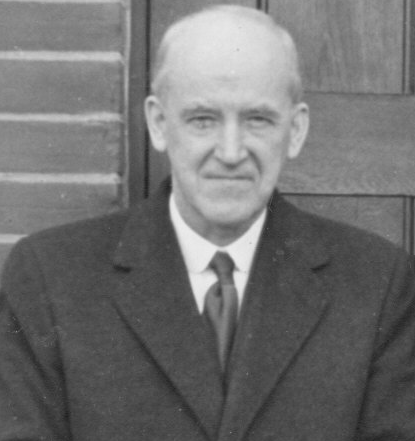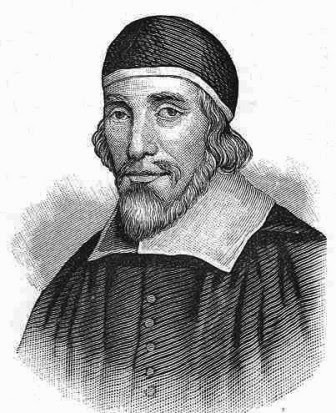The Rev John Rogers, with Justice Cradock and his Granddaughter
It has frequently been found that circumstances that appear to be of a very trifling incidental nature lead to results of very great moment and value, and those results are sometimes brought to light in a remarkable manner. These things will be regarded by the reader as strikingly manifest in the following incidents which occurred in the life of Mr John Rogers, who was ejected from the living of Croglin in Cumberland.
Sir Richard Cradock, who was a violent hater and persecutor of the Dissenters, and who exerted himself to enforce all the severe laws then in being against them, happened to live near Mr Rogers, to whom he bore a particular enmity, and whom he wanted above all things to have in his power. Hearing that he was one day to preach some miles distant, he thought a fair opportunity offered for accomplishing his base design, and in order to it, directed two men to go as spies, and take down the names of all the hearers whom they knew, that they might appear as witnesses against them, and against Mr Rogers. The plan seemed to succeed to his wishes. These men brought him the names of several persons who were present at the meeting, and he summoned such of them as he had a particular spite against, together with Mr Rogers, to appear before him. Knowing the violence of the man, they came with trembling hearts, expecting to be treated with the utmost severity. "While they were waiting in the great hall, expecting to be called upon, a little girl about six or seven years of age, who was Sir Richard's granddaughter, happened to come into the hall. She looked at Mr Rogers, and was much taken with his venerable appearance.
He being naturally fond of children, took her upon his knee and caressed her, which occasioned her to have a great fondness for him. At length Sir Richard sent a servant to inform him and the rest, that one of the witnesses being taken ill and unable to attend, they must come again another day.
They accordingly came at the time appointed, and being convicted, the justice ordered their mittimus to be written, to send them all to prison. Mr Rogers expecting to see the little girl again, brought some sweetmeats with him to give her. As soon as she saw him, she came running to him, and appeared fonder of him than before. This child was a particular favourite of her grandfather, and had got such an ascendancy over him, that he could deny her nothing; and she possessed such a violent spirit, that she could bear no contradiction; so that she was indulged in everything she wanted. At one time, when she was contradicted, she ran a penknife into her arm, to the great danger of her life. This bad spirit, in the present instance, was overruled for good. Whilst
she was sitting on Mr Rogers's knee, eating the sweetmeats, she looked earnestly at him, and asked, "What are you here for, sir?" He answered, "I believe your grandfather is going to send me and my friends to jail." "To jail," says she, "why, what have you done?" "Why, I did nothing hut preach at such a place, and they did nothing but hear me." "But," says she, "my grandpapa shan't send you to jail." "Ay, but, my dear," he replied, "I believe he is now making out our mittimus to send us all there." Upoii this, she ran up to the chamber where Sir Eichard was, and knocked with her head and heels till she got in, and said to him, " What are you going to do with my good old gentleman in the hall?" "That's nothing to you," said he, "get about your business." "But I won't," she said, "he tells me that you are going to send him and his friends to jail; and if you send them, I'll drown myself in the pond as soon as they are gone; I will, indeed," When he saw the child thus peremptory, it shook his resolution, and induced him to abandon his malicious design. Taking the mittimus in his hand, he went down into the hall, and thus addressed these good men: "I had made out your mittimus to send you all to jail, as you deserve, but at my grandchild's request, I drop the prosecution and set you all at liberty." They all bowed, and thanked his worship; but Mr Rogers, going to the child, laid his hand upon her head, and lifting up his eyes to heaven, said, "God bless you, my dear child. May the blessing of that God whose cause you did now plead, though as yet you know him not, be upon you, in life, at death, and to all eternity." He and his friends then went away.
The above remarkable story was told by Mr Timothy Rogers, the son of the ejected minister, who had frequently heard his father relate it with great pleasure; and the celebrated Mr Thomas Bradbury once heard it from him when he was dining at the house of Mrs Tooley, an eminent Christian lady, in London, who was distinguished for her piety, and for her love to Christ and his people, whose house and table, like Lydia's, were always open to them.
"What follows is yet more remarkable, as containing a striking proof of the answer which was returned to good Mr Rogers's prayer for this child, and the blessing which descended upon her who had been the instrument of such a deliverance for these persecuted servants of God. Mrs Tooley had listened with uncommon attention to Mr Rogers's story, and when he had ended it, she asked him, "And are you that Mr Rogers's son?" He told her he was, upon which she said, "Well, as long as I have been acquainted with you, I never knew that before; and now I will tell you something whieh you do not know—I am the very girl your dear father blessed in the manner you have related, and it made an impression upon me which I could never forget." Upon this double discovery, Mr Rogers and Mrs Tooley found an additional tie of Christian affection, and then he and Mr. Bradbury expressed a desire to know how she, who had been brought up in an aversion to the Dissenters, and to serious religion, now discovered such an attachment to both. Upon which, Bhe cheerfully gave them the following narrative:—
After her grandfather's death, she became sole heiress to his estate, which was considerable. Being in the bloom of youth, and having none to control her, she ran into all the fashionable diversions of the age, without any restraint. But she confessed, that when the pleasurable scenes were over, she found a dissatisfaction both with them and herself, that always struck a damp to her heart, which she did not know how to get rid of any other way than by running the same round over and over again; but all was in vain. Having contracted some slight illness, she thought she would go to Bath, hearing that it was a place for pleasure as well as health. When she came thither, she was providentially led to consult an apothecary, who was a very worthy and religious man. When he inquired what ailed her, she answered, "Why, doctor, I don't ail much as to my body; but I have an uneasy mind, that I can't get rid of." "Truly, miss," said he, "I was so, until I met with a certain book, and that cured me." "Books," she said, " I get all the books I can lay my hands on; all the plays, novels, and romances I hear of; but, after I have read them, my uneasiness is the same." "That may be, miss," he replied, "and I don't wonder at it. But as to this book I speak of, I can say of it what I can say of no other I ever read, that I never tire in reading it, but can begin to read it again as if I had never read it before; and I always see something new in it." "Pray, doctor," says she, "what book is that?" "Nay, miss," said he, "that's a secret I don't tell every one." "But could not I get a sight of that book?" she inquired. "Yes," he said, "if you speak me fair, I can help you to a sight of it." "Pray then get it me, doctor, and I will give you anything you please." "Yes," said he, "if you will promise me one thing, I will bring it to you; and that is, that you will read it over carefully, and that if you should not see much in it at first, that you will give it a second reading." She promised faithfully that she would. After coming two or three times without it, to raise her curiosity, he at last took it out of his pocket and gave it her. The book was the New Testament. When she looked at it, she said, with a flirt, "Poh! I could get that at any time." "Why, miss," said he, "so you might; but remember, I have your solemn promise carefully to read it." "Well," she said, "though I never read it before, I'll give it a reading." Accordingly, she began to read it, and it soon attracted her attention. She saw something in it wherein she had a deep concern; but her mind now became ten times more uneasy than ever.
Not knowing what to do, she soon returned to London, resolved to try again what the diversions there would do to dissipate her gloom. But nothing of this kind answered her purpose. She lodged at the Court end of the town, where she had with her a female companion. One Saturday night she had a remarkable dream, which was, that she was in a place of worship, where she heard a sermon; but when she awoke, she could remember nothing but the text. This dream, however, made a deep impression upon her mind; and the idea she had of the place, and of the minister's person, was as strong as if she had been long acquainted with both. On the Lord's-day morning, she told her dream to her companion, and said that, after breakfast, she was resolved to go in quest of the place, though she should go from one end of London to the other.
They accordingly set out, and went into several churches as they passed along, but none of them answered to what she saw in her dream. About one o'clock she found herself in the heart of the City, where they dined, and then set out again in search of this place of worship. Being in the Poultry, about half an hour after two o'clock, they saw a great number of people going down the Old Jewry, and she determined to see where they went. She mingled with the company, and they conducted her to the meeting-house in the Old Jewry, where Mr Shower was then minister. As soon as she entered the door and surveyed the place, she turned to her companion and said, with some surprise, " This is the very place I saw in my dream." It was not long before she saw Mr Shower go up into the pulpit, and looking at him, with greater surprise, she said, "This is the very man I saw in my dream; and if every part of it hold true, he will take for his text Psalm 96:7, 'Return unto thy rest, O my soul, for the Lord hath dealt bountifully with thee.'" When he rose up to pray, she was all attention, and every sentence went to her heart. Having finished his prayer, he took that very passage which she had mentioned, for his text; and God was pleased to make the discourse founded upon it the means of her saving conversion. And thus she at last found, what she had so long sought elsewhere in vain—rest to her soul. And now she obtained that blessing from God, which pious Mr Rogers, so many years before, had so solemnly and fervently implored on her behalf.

















.jpg/220px-Thomas_Watson_(Puritan).jpg)
